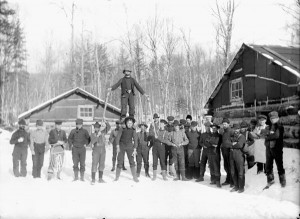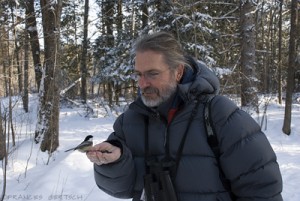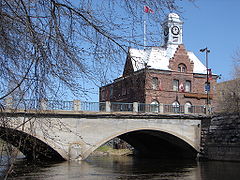 Visit a community college during the evening and it a very different environment than during the day. Sure, there are still students lingering in common areas, the library and maybe the gymnasium or fitness centre, but there’s a lot less action than the hub bub that encircles the day time hours of a college campus. Most of the full-time students, and the college staff and faculty have gone home for the day, leaving the hallways still with the occasional strategically placed “don’t slip” sign left by the janitor on a freshly washed floor.
Visit a community college during the evening and it a very different environment than during the day. Sure, there are still students lingering in common areas, the library and maybe the gymnasium or fitness centre, but there’s a lot less action than the hub bub that encircles the day time hours of a college campus. Most of the full-time students, and the college staff and faculty have gone home for the day, leaving the hallways still with the occasional strategically placed “don’t slip” sign left by the janitor on a freshly washed floor.
It is in this environment that night class teachers arrive on campus, probably at the end of an already long day working their “day job.” You see, most college faculty that teach at night are often there because they simply enjoy sharing their expertise with others, but it doesn’t happen without a great deal of commitment. Teaching requires preparation, and when you are holding down a full time job and have personal responsibilities to attend to, tagging on extra hours to teach night classes is a lot of extra work. I know, because I’ve done it.
Unfortunately, the contributions that these lonely night teachers make to the college and the greater community often go unnoticed to the majority of the college population. With the exception of the manager who hired them, the students that take their classes, and the janitors that regularly work the evening shift and may eavesdrop from the hallway, their great work in the classroom is unheralded.
Recently I attended a night class at Algonquin College’s Waterfront Campus on the History of Pembroke’s churches taught by local historian Bruce Pappin. The 3 hour class was sold out and Pappin’s presentation was captivating. After the class, I asked him how long he had prepared for the class. The answer was an astounding five full days! Pappin had pulled out some wonderful historical documents and photos to be used in his Powerpoint presentation that brought his lecture to life. By the end of the night, I felt that I knew some of the settlers who had built many of the magnificent churches that still stand in the city as a living tribute to the founding families of Pembroke.

A floor below, bird watching expert Bruce Dilabio was also teaching to a full class. As I was leaving the college I asked some of his students how they enjoyed their evening of learning. Overwhelmingly, the students were thrilled and spoke highly of Dilabio’s preparation for the course and how much information he had shared on this popular outdoor activity. Remember if was only the first night of a four night course and already Dilabio was being lauded for his expertise in teaching.

Unfortunately, it was a pretty small crowd that truly appreciated how great the teaching had been on this rainy spring night in the Ottawa Valley. When the students left the classroom, both Bruce’s had a lonely walk out of the building to the parking lot, leaving the campus just before security locked up the doors and turned out the lights.
The point is these night class teachers go above and beyond what is expected of them in ensuring colleges offer the best product they can through their continuing education programming. It’s time to celebrate these less noticed faculty by recognizing their contribution to higher education in Ontario.
I’d love to hear your story about your favourite night class teacher or your thoughts on this blog.
Learn more about our night class teachers and our Continuing Education on campus!
Posted by: Jamie Bramburger

